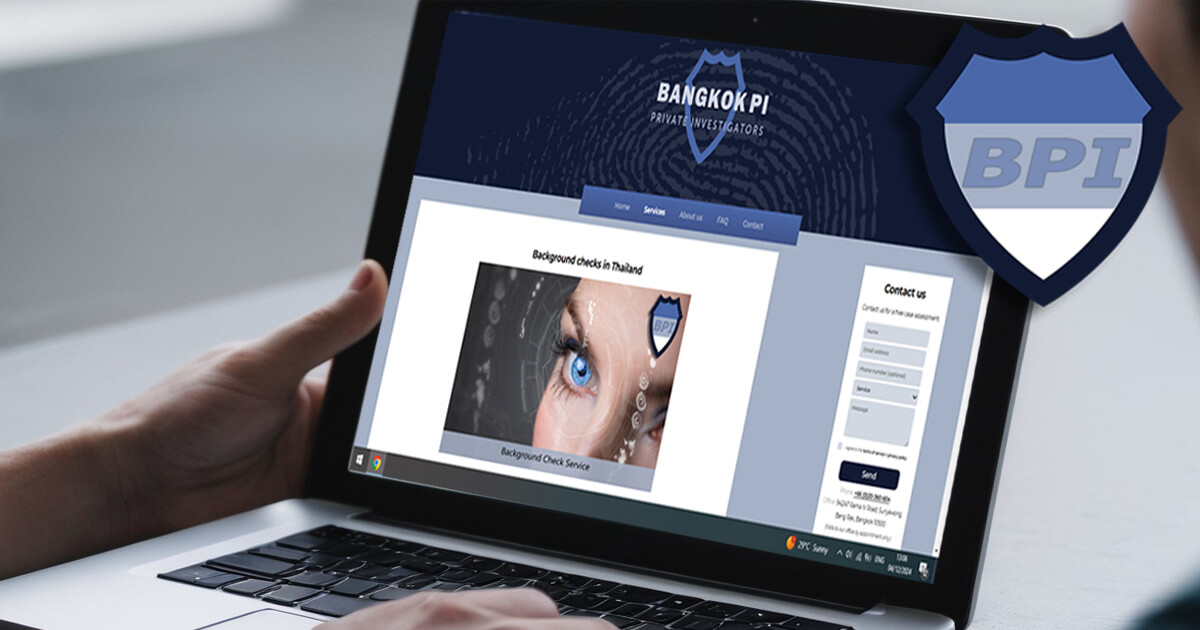Why Do Thai People Use Fake Names on Social Media?
November 3, 2024 - Reading time: 7 minutes
Updated: December 4, 2024
Thai social media users often go by aliases, nicknames or fake names, a unique aspect of Thai culture that’s common across Southeast Asia. While nicknames are used worldwide, they have deeper significance in Thailand, where nearly everyone has a lifelong nickname. This habit makes online identities harder to trace, presenting challenges for private investigations or those looking to conduct OSINT research on Thai citizens.

Learn more about our background check service.
Why Do Thai People Use Nicknames?
Thai nicknames often stem from tradition. Historically, families gave babies nicknames to confuse evil spirits, believing these names protected their children. Over time, this practice became an enduring custom, and today, nicknames are often as unique and quirky as the individual. Given that nicknames are frequently used in place of formal names, especially on social media, many Thai profiles display names unrelated to their legal identities.
The Rise of Fake Names and Aliases on Social Media
Beyond traditional nicknames, it’s now common to see entirely fictitious names on Thai social media. Many people adopt these names to maintain privacy, avoid detection, or express creativity. This widespread use of aliases complicates efforts for anyone seeking to identify or contact them directly. As a result, OSINT-style investigative work that relies on social media can be time-consuming and complex, particularly if the search is based solely on legal names, or if the subject’s legal name is unknown.
As a leading detective agency in Thailand, we often encounter the challenge of Thai social media users adopting fake or alternate names, making it harder to trace their true identities. Our investigative approach is always tailored to each case, taking into account the circumstances and any available information. We carefully consider why our client seeks to locate the subject, along with any additional details they provide or that we uncover during our assessment.
Challenges for Investigators
In investigations across Thailand and Southeast Asia, fake names and aliases can make tracing individuals through social media very difficult. Here’s how these aliases impact various investigative scenarios and how Bangkok Investigators approaches these obstacles:
1. Privacy through False Names
Sometimes, the alias serves as a privacy tool. For example, an individual involved in a business transaction may use a fake name online, making it challenging to confirm their identity. Investigators then have to bridge the gap between the online persona and the person’s legal identity, often requiring creative methods to make these connections.
2. Nicknames to Avoid Recognition
In cases of fraud or missing persons cases, a subject might use a very common nickname to (inadvertently or intentionally) avoid recognition. When the name is too generic, such as “Noi” or “Lek,” it becomes nearly impossible to track down any unique information, unless other details are available. In these instances, investigators rely on indirect clues like mutual friends, profile images, and tagged locations to narrow down the correct profile.
3. Aliases in Relationships
For cases of suspected infidelity, a subject may create an alternate social media profile with a fake name. This alias often allows them to maintain relationships without their partner’s knowledge, making it harder for investigators to uncover. By analysing factors like tagged photos, location data, and shared connections, investigators can sometimes link the alias back to the subject.
Names in Thai Script vs. English Letters
For Thai citizens, official records in Thailand exclusively use Thai script for their names (for example: จอห์น สมิธ). While some identification documents may include a version of the name in English letters, this is typically an automated phonetic translation that doesn’t hold any official status in Thai records. Therefore, for researching or tracing Thai citizens, it’s essential to have the name in Thai script, as no official records exist for Thai citizens under English spellings.
Translating a name from English to Thai can also be challenging due to the unique Thai alphabet, with its extensive array of characters and phonetic nuances. This makes finding accurate matches or performing a trace more complex when only an English name is available (when the name itself is genuine).
Investigative Tools to Bypass Nicknames
Given these challenges, we can use a range of tools to verify identities beyond names alone:
- On The Ground (HUMINT) Investigations: In many cases it can be helpful to physically deploy an agent in order to gather information by conducting interviews in person.
- Facial Recognition: Useful for linking different profiles or discovering new profiles/media, even when the subject is using a fictitious name.
- Network Connections: An individual’s social connections often lead to valuable clues about their true identity.
- Tagged Locations and Check-ins: Location data on social media posts can confirm a person’s movements and affiliations, which may provide scope for further investigation.
- Behavioural Patterns and Interests: Hobbies and interests can help narrow down profiles to those of the actual subject.
Why Choose Bangkok Investigators?
With years of experience navigating the intricacies of Thai social media, we offer expert investigations that look beyond names. Our methods reveal the truth, no matter how elusive the individual may be.
Reach out for a free, no-obligation quote, and let’s discuss how our background checks and social media investigations can give you the answers you’re looking for.
Related articles
Search
Bangkok Investigators

Discover more about Bangkok Private Investigators on our homepage or by visiting our About Us page.